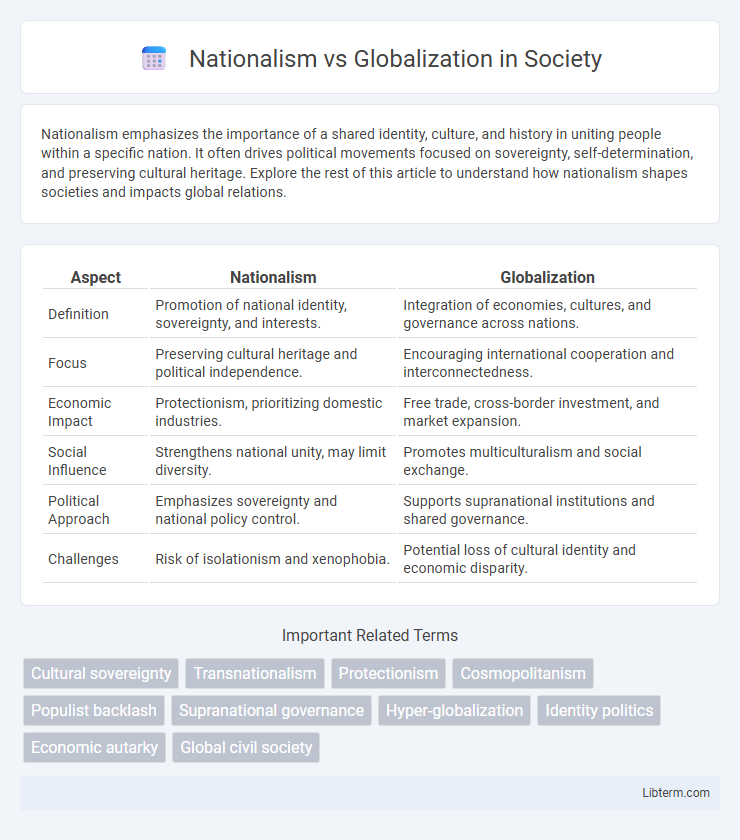Nationalism emphasizes the importance of a shared identity, culture, and history in uniting people within a specific nation. It often drives political movements focused on sovereignty, self-determination, and preserving cultural heritage. Explore the rest of this article to understand how nationalism shapes societies and impacts global relations.
Table of Comparison
| Aspect | Nationalism | Globalization |
|---|---|---|
| Definition | Promotion of national identity, sovereignty, and interests. | Integration of economies, cultures, and governance across nations. |
| Focus | Preserving cultural heritage and political independence. | Encouraging international cooperation and interconnectedness. |
| Economic Impact | Protectionism, prioritizing domestic industries. | Free trade, cross-border investment, and market expansion. |
| Social Influence | Strengthens national unity, may limit diversity. | Promotes multiculturalism and social exchange. |
| Political Approach | Emphasizes sovereignty and national policy control. | Supports supranational institutions and shared governance. |
| Challenges | Risk of isolationism and xenophobia. | Potential loss of cultural identity and economic disparity. |
Introduction to Nationalism and Globalization
Nationalism emphasizes the prioritization of a nation's sovereignty, cultural identity, and political independence, often fostering a sense of unity and collective pride among its citizens. Globalization refers to the increasing interconnectedness and interdependence of countries through trade, communication, and technology, promoting cultural exchange and economic integration. The tension between nationalism and globalization centers on balancing national interests with global cooperation and the flow of goods, ideas, and people.
Historical Roots of Nationalism
The historical roots of nationalism trace back to the late 18th and early 19th centuries with the rise of nation-states in Europe, fueled by Enlightenment ideas and revolutions such as the French Revolution. Nationalism emphasized shared language, culture, and history as the basis for political unity, opposing imperial empires and colonial rule. This movement laid the groundwork for modern state sovereignty, often conflicting with globalization processes that promote transnational integration and economic interdependence.
The Rise of Globalization: An Overview
The rise of globalization has transformed economic, cultural, and political landscapes by fostering interconnectedness and cross-border trade among nations. This process has accelerated through advancements in technology, communication, and transportation, enabling multinational corporations to expand their reach and influence globally. Globalization challenges traditional nationalist policies by promoting integration, diversity, and cooperation among countries, reshaping national identities and sovereignty.
Key Differences Between Nationalism and Globalization
Nationalism emphasizes sovereignty, cultural identity, and prioritizing the interests of a specific nation-state, often advocating for protectionist policies and limiting external influence. Globalization promotes interconnectedness, cross-border trade, and cultural exchange, aiming to create a globally integrated economy and society. The fundamental difference lies in nationalism's focus on local autonomy versus globalization's drive for international cooperation and economic interdependence.
Economic Impacts: Protectionism vs Free Trade
Nationalism-driven protectionism often leads to increased tariffs and trade barriers, aiming to safeguard domestic industries but potentially causing higher consumer prices and reduced market efficiency. In contrast, globalization promotes free trade by reducing tariffs and fostering international economic integration, which can boost economic growth, innovation, and consumer choice. However, free trade may also contribute to job displacement and income inequality within certain sectors or regions.
Cultural Identity in a Globalized World
Nationalism emphasizes preserving cultural identity by promoting local traditions, languages, and values as a defense against the homogenizing effects of globalization. Globalization facilitates cultural exchange and interconnectedness, often challenging distinct cultural identities through widespread adoption of global norms and consumer habits. The tension between nationalism and globalization shapes how societies negotiate cultural preservation and integration within an interconnected world.
Political Implications and Governance
Nationalism emphasizes sovereign control and prioritizes national interests, often leading to stricter immigration policies and protectionist trade measures, which reshape governance by reinforcing state-centric power structures. Globalization fosters interconnected governance frameworks and multilateral cooperation, challenging traditional state sovereignty through transnational institutions and international regulations. Political implications include intensified debates on sovereignty versus global governance, affecting policy-making, diplomatic relations, and the legitimacy of supranational bodies.
Social Cohesion: Unity or Division?
Nationalism often strengthens social cohesion by promoting a shared identity and cultural heritage, fostering unity within a nation-state. Globalization, however, can challenge this cohesion by introducing diverse perspectives and cultural influences that may lead to social fragmentation or integration depending on societal responses. Social cohesion in the context of nationalism versus globalization hinges on balancing national identity with inclusive multiculturalism to maintain unity while embracing global interconnectedness.
National Security and Global Cooperation
Nationalism prioritizes national security by emphasizing sovereign control over borders, resources, and military capabilities to protect a nation from external threats. Globalization encourages international collaboration, promoting a network of global cooperation through multilateral agreements, shared intelligence, and coordinated responses to transnational challenges like terrorism and cyber threats. Balancing national security concerns with the benefits of global cooperation requires policies that safeguard sovereignty while facilitating diplomatic partnerships and information exchange.
Future Trends: Bridging Nationalism and Globalization
Future trends indicate a growing effort to bridge nationalism and globalization by promoting policies that balance national sovereignty with international cooperation. Emphasis on technological innovation, cross-border digital economies, and climate change agreements illustrates how interconnected challenges encourage collaboration without erasing cultural identities. Adaptive governance models that integrate local interests with global frameworks will shape the evolving relationship between nationalism and globalization.
Nationalism Infographic

 libterm.com
libterm.com